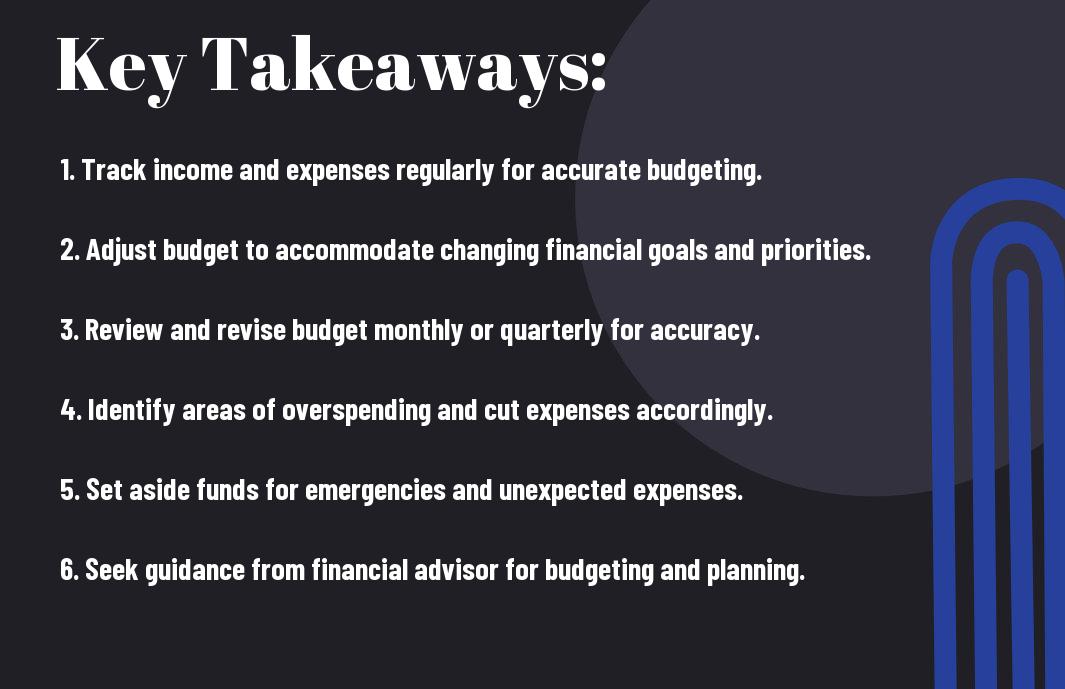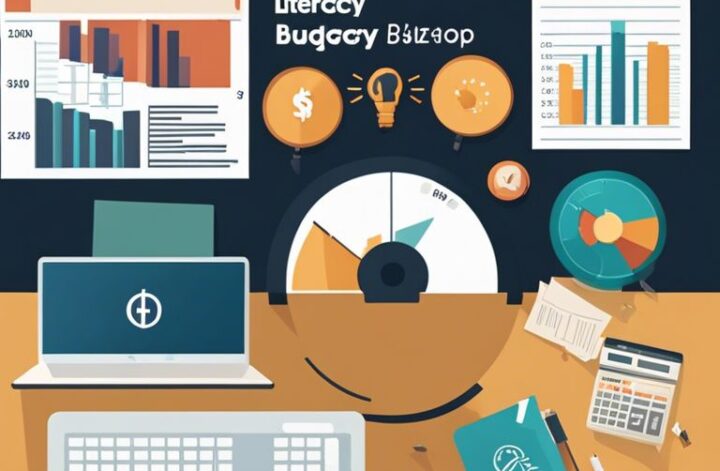There’s no question that creating a budget is a crucial step in managing your finances effectively. However, setting a budget and then forgetting about it can lead to missed opportunities and financial pitfalls. Regularly reviewing and adjusting your budget is vital to ensure that it accurately reflects your financial situation and goals. In this blog post, we will discuss the importance of conducting an annual financial checkup to evaluate and adjust your budget accordingly.

Key Takeaways:
- Stay on track: Regularly reviewing and adjusting your budget can help you stay on track with your financial goals and avoid overspending.
- Adapt to changes: Life is dynamic, and your financial situation can change over time. By updating your budget, you can adapt to new circumstances and goals.
- Identify areas for improvement: Reviewing your budget can help you identify areas where you may be overspending or where you can cut costs to save more money.
- Set new goals: As your financial situation evolves, your goals may also change. Adjusting your budget can help you set new financial goals and work towards achieving them.
- Improve financial stability: By regularly evaluating and adjusting your budget, you can improve your overall financial stability and make better decisions with your money.
Understanding Your Current Financial Situation
The first step in conducting your annual financial checkup is to assess your current financial situation. This involves taking a detailed look at both your income streams and expenditure patterns to get a clear picture of where your finances stand.
Assessing Your Income Streams
Your income streams are the lifeblood of your financial stability. It is important to have a comprehensive understanding of all the sources of income coming into your household. This includes not only your primary job salary but also any side hustles, rental income, investment dividends, or other sources of financial inflow. By understanding your various income streams, you can better plan for potential changes and ensure a steady flow of funds to support your financial goals.
Analyzing Your Expenditure Patterns
Understanding how you spend your money is crucial in determining your financial health. Analyze your expenditure patterns by reviewing your past bank statements, credit card bills, and receipts. Categorize your expenses into fixed costs (such as rent, utilities, and insurance) and variable costs (such as dining out, entertainment, and shopping). By identifying where your money is going, you can pinpoint areas where you may be overspending and make necessary adjustments to align your spending with your financial goals.
Setting Financial Goals for the Upcoming Year
Short-Term vs. Long-Term Goal Setting
Assuming you have already assessed your current financial situation, the next step is to set clear and achievable goals for the upcoming year. It is necessary to distinguish between short-term and long-term financial objectives in order to create a strategic plan. Short-term goals typically have a timeframe of one year or less, such as saving for a vacation or paying off a credit card debt. On the other hand, long-term goals extend beyond the next year, like saving for retirement or purchasing a home.
Prioritizing Financial Objectives
The key to successful budgeting is prioritizing financial objectives based on your individual needs and aspirations. The importance of each goal may vary depending on your specific circumstances. For example, building an emergency fund might take precedence over investing in a new car if you have unstable income or face unexpected expenses. By evaluating your priorities, you can allocate your resources more effectively and work towards achieving your financial goals.
This strategic approach ensures that you are focusing your efforts and resources on what truly matters to you, rather than simply spending money based on impulse or societal pressure. By carefully considering and prioritizing your financial objectives, you can create a budget that reflects your values and aspirations, ultimately leading to greater financial stability and success in the long run.
Evaluating Changes in Your Financial Circumstances
Keep a close eye on your income to ensure your budget remains aligned with your financial goals. Regularly review your sources of income and track any changes in your earnings. Recognizing increases or decreases in income is vital for adjusting your budget accordingly. For example, if you receive a pay raise or take on a side hustle, you may have more disposable income to allocate towards savings or investments. Conversely, a job loss or reduction in hours may require you to reevaluate your expenses and find areas to cut back on.
Adapting to Life Changes that Impact Finances
Evaluating the impact of major life changes on your finances is crucial for maintaining a balanced budget. Whether you’re getting married, having a baby, or buying a home, these milestones can significantly alter your financial situation. For instance, starting a family may increase your expenses for childcare and healthcare, prompting you to reassess your budget categories. Adapting to life changes that impact finances involves planning ahead and making adjustments to accommodate new financial responsibilities.

Reviewing Debt and Savings Strategies
Strategies for Debt Reduction
For an effective debt reduction strategy, start by evaluating your current debts and interest rates. Prioritize paying off high-interest debts first, such as credit card balances, as they can quickly accumulate and hinder your financial progress. Consider consolidating debts or negotiating lower interest rates to make repayment more manageable. Setting a strict budget for debt repayment each month can also help you stay on track and make progress towards becoming debt-free.
Savings Plans and Emergency Funds
Debt often takes precedence, but it’s equally important to prioritize saving for emergencies and future goals. Aim to save at least 3-6 months’ worth of living expenses in an emergency fund to protect yourself from unexpected financial setbacks. Consider setting up automatic transfers to a savings account each month to ensure consistent savings contributions. Additionally, regularly review your savings goals and adjust them based on your financial situation and long-term objectives.
Adjustment of Budget Categories
Not reviewing and adjusting your budget regularly can lead to financial instability and missed opportunities for growth. It is vital to periodically assess your financial situation and goals to ensure that your budget aligns with your current needs and priorities. Completing a Financial Health Check can help you identify areas where adjustments may be necessary.
Fixed vs. Variable Expenses
For effective budget adjustments, it’s crucial to differentiate between fixed and variable expenses. Fixed expenses such as rent and utilities remain relatively constant month-to-month, while variable expenses like groceries and entertainment can fluctuate. By categorizing expenses in this way, you can better control your spending and make informed decisions about where to allocate your funds.
Allocating Funds for Recreational Activities
On top of necessary expenses, allocating funds for recreational activities is necessary for maintaining a balanced lifestyle. Research suggests that setting aside a portion of your budget for recreational activities can improve overall well-being and reduce stress. It’s crucial to prioritize self-care and leisure activities when adjusting your budget to ensure you’re investing in your mental and emotional health.
Understanding the importance of regularly reviewing and adjusting your budget to reflect changes in your financial situation and goals is key to financial success. By taking the time to assess your spending habits and make necessary adjustments, you can better manage your finances and work towards achieving your long-term objectives.
The Role of Investment in Financial Planning
Reviewing Current Investment Portfolios
Financial planning is crucial for ensuring stability and growth in your financial future. Despite the best-laid plans, changes in the economic environment or personal circumstances can impact your investments. Regularly reviewing and adjusting your investment portfolio is important to keep it aligned with your financial goals. If you want to learn more about assessing your financial health, consider checking out the Year-End Financial Checkup: Assessing Financial Health resource.
Aligning Investments with Future Goals
Financial planning includes aligning your investments with your future goals. For instance, as you approach retirement, you may want to shift your portfolio towards more conservative investments to protect your savings. On the other hand, if you have long-term financial goals, such as saving for a child’s education or purchasing a home, you might consider more aggressive growth-oriented investments to maximize returns over time.
Utilizing Financial Tools and Resources
Budgeting Software and Apps
Budgeting is crucial for managing your finances effectively. There are numerous budgeting software and apps available that can help you track your income, expenses, and savings goals. These tools provide user-friendly interfaces, automatic categorization of expenses, and customizable budgeting templates, making it easier for you to stay organized and in control of your financial situation.
Professional Financial Advice
Apps, while useful, may not always provide personalized advice tailored to your specific financial situation and goals. Seeking professional financial advice from a financial planner or advisor can help you create a comprehensive financial plan, set realistic financial goals, and make informed decisions about your money. With their expertise and knowledge of the market, they can provide valuable insights and recommendations to help you grow and protect your assets.

Staying Informed on Tax Laws and Benefits
Your annual financial checkup is a crucial time to review your understanding of current tax laws and benefits that could impact your financial planning. Staying informed on changes in tax regulations can help you maximize your savings and take advantage of available deductions and credits. For a comprehensive guide on completing a financial checkup, check out Completing a Financial Checkup In 9 Steps | Perspectives.
Understanding Tax Deductions and Credits
Informed decision-making regarding tax deductions and credits can significantly benefit your financial situation. By staying up to date on the latest tax laws, you can ensure that you are taking full advantage of any available deductions or credits that may apply to your specific circumstances. It’s imperative to stay informed to make informed decisions and optimize your tax savings.
Planning for Tax-Advantaged Savings
Savings in tax-advantaged accounts, such as 401(k)s or IRAs, can provide significant benefits for your future financial security. Another important aspect of staying informed on tax laws is understanding how to utilize these accounts to maximize your tax savings while also increasing your retirement savings. By strategically planning and contributing to tax-advantaged accounts, you can take advantage of potential tax benefits and build a stronger financial foundation for the future.
Continuous Monitoring and Reevaluation
Quarterly Review Practices
Now more than ever, it is crucial to regularly review and adjust your budget to reflect changes in your financial situation and goals. Any successful budgeting strategy needs a periodic check-up to ensure you are on track to meet your financial objectives. Quarterly reviews serve as a reliable way to stay proactive and aware of any deviations from your initial budget plan. By assessing your income and expenses every three months, you can promptly identify areas that may need adjustments to ensure you are staying within your financial limits.
Adjusting for Unexpected Financial Shifts
Financial stability is a top priority for most individuals, and being prepared for unexpected financial shifts can make a significant difference in your financial well-being. In case of sudden changes such as job loss, medical emergencies, or unforeseen expenses, having a contingency plan in place is crucial. Review and adjust your budget accordingly to accommodate these unexpected situations and ensure that you stay on track towards your long-term financial goals. Being proactive in making necessary budget adjustments can help you navigate through unpredictable financial challenges with more ease and confidence.
Review your financial situation regularly and be prepared to adjust your budget as needed to reflect changes in your financial goals and circumstances. Being proactive in monitoring your budget and making necessary adjustments will help you stay on top of your finances and make informed decisions to secure your financial stability and future success.

Final Words
To wrap up, regularly reviewing and adjusting your budget is crucial in effectively managing your financial situation and achieving your goals. By keeping a close eye on your income, expenses, and financial goals, you can make informed decisions and ensure that your budget remains aligned with your current needs and priorities. As life circumstances change, such as getting a new job, starting a family, or facing unexpected expenses, it is important to be flexible and willing to adjust your budget accordingly.
By proactively reviewing and adjusting your budget, you can stay on track with your financial goals, avoid unnecessary stress, and make the most of your money. Remember that your budget is a dynamic tool that should evolve with you as your financial situation changes. Ultimately, regularly evaluating and adjusting your budget can lead to better financial stability and help you build a secure financial future.




